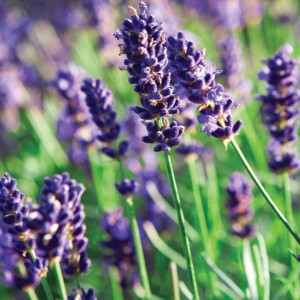Lavandula angustifolia is included in the Tasmanian Fire Service’s list of low flammability plants, indicating that it is suitable for growing within a building protection zone.
Contents
Uses
- The flowers and leaves are used as an herbal medicine, either in the form oflavender oil or as an herbal tea. The flowers are also used as a culinary herb, most often as part of the French herb blend called herbes de Provence.
- Lavender essential oil, when diluted with a carrier oil, is commonly used as a relaxant with massage therapy. Products for home use, such as lotions, eye pillows (including lavender flowers or the essential oil itself) and bath oils, etc., are also used. Both the petals and the oil are the most popular ingredients in handmade soap.
- Dried lavender flowers and lavender essential oil are also used as a prevention against clothing moths, which do not like their scent.
Benefits
- Anxiety and Stress: There are a number of methods to use lavender to soothe anxiety and stress. The natural organic compounds in the leaves and flowers of lavender can be ground between the fingers and then rubbed into the temples. This topical application can soothe the body and mind, relieving anxious thoughts and balancing out mood. Aside from this topical application of the flowers themselves, you can also brew lavender tea and achieve much the same effect. The antioxidant components of lavender can impact the endocrine system of the body to lower the levels of stress hormones in the body.
- Sleep Issues: If you regularly struggle with insomnia, apnea, or restless sleep patterns, it can seriously impact your life. By brewing a few lavender flowers in hot water, you can steep a wonderful tea that has been used to induce sleep and relaxation for thousands of years. This is closely linked to the flower’s impact on the nervous system, and can also help to clear your mind of negative thoughts or clutter. Lavender is commonly combined with meditation techniques, either in essential oil or aromatherapy form.
- Anti-Inflammatory Qualities: Everyone is looking for a reliable way to relax the body and mind, and lavender takes care of both. If you add flowers to your bathwater and take a nice long soak, the anti-inflammatory components of lavender can help to reduce inflammation throughout the body and easy hurting muscles. The anti-inflammatory and antioxidant properties of lavender are quite potent, and this is one of the most trusted applications of lavender flowers.
- Skin Care: An easy, mobile way to always take care of your skin is to fill a spray bottle with lavender flowers. When your skin is feeling dry or irritated, simply spray some of the infused water on the area and enjoy the quick relief that it can provide. This can also work for chronic conditions, like psoriasis, eczema, and even acne.
- Antiseptic Ability: Although many people turn to lavender to relaxation and aromatherapeutic applications, its effect on infection is impressive, to say the least. Many people apply crushed lavender leaves on wounds and injuries to promote not only quick healing of the wounds, but also to prevent thedevelopment of infections at those sites. This has been a popular use for lavender since antiquity.
- Hair Health: If you suffer from hair loss or any other condition that affects the quality and health of your hair, seek out a lavender-based shampoo. However, some of those organic cosmetic products can be quite expensive, while others may claim to be derived from lavender and still contain harsh chemicals. One of the best options is to steep lavender flowers as though you are brewing tea and then apply that mixture to your hair. It will function as an effective shampoo and significantly boost the health of your follicle beds and hair.
- Heart Issues: The relaxing qualities of lavender, which come from its organic compounds and antioxidants, also help the heart by reducing blood pressure and easing the tension of blood vessels. This can prevent atherosclerosis and other cardiovascular issues, thereby lowering your risk of strokes and heart attacks.
- Bloating and Digestive Issues: The polyphenols found in lavender have a wide range of effects on the body, including anti-aging impacts, but it can also help prevent the development of harmful bacteria in the gut. Essentially, this will prevent the accumulation of gas in the gut from the emissions of those bacteria. This will ease stomach discomfort, reduce bloating, and eliminate cramping. Either chewing on lavender leaves or drinking a lavender tea can be effective in this way.
Cautions
No side effects are known. Please consult your pharmacist.
Interactions
Unknown, please consult with your doctor.
Other names
lavender or English lavender, though not native to England; also garden lavender, common lavender, true lavender, narrow-leaved lavender
References
Source: Wikipedia, https://en.wikipedia.org/wiki/Lavandula_angustifolia
OrganicFacts, https://www.organicfacts.net/health-benefits/herbs-and-spices/lavender.html

